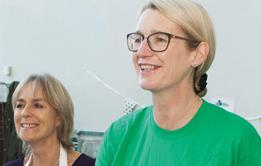Increasing pressure on healthcare professionals demands a close look at volunteering, writes Adrienne Fresko

Health and social care professionals and managers are being challenged to deliver more care, with less resource, in new integrated ways – while putting the patient or user centre stage.
Being overstretched and understaffed is a frequent concern – with the attendant risks around safety of services and less time for compassion or person centred care.
So is there something here for the NHS and social care to learn from Macmillan in terms of how to really engage and embrace volunteers in the delivery of care – particularly in integrated community settings?
Of course, volunteering has always been a well-established part of the delivery of health services. A 2013 King’s Fund report, Volunteering in health and care: Securing a sustainable future, showed that three million people volunteer for health, disability and welfare organisations in England alone. About 2.5 per cent of these volunteers are based in hospitals.
Need for strategic approach
The gauntlet thrown down by Lynda Thomas to commissioners, providers and health and wellbeing boards is this: are you considering the strategically important role that volunteers can play in enabling the delivery of your health and social care system’s strategy? The research evidence suggests that volunteers improve patient experience, contribute to tackling health inequalities and support integrated care for people with multiple needs.
In our work with boards across health and social care, we find that only a minority are giving real strategic focus and attention to the potential of volunteers.
Those that do find they need to overcome obstacles, including healthcare professionals’ fears around job substitution, as well as a tendency to misconstrue investment in volunteering as a device to cut costs rather than an important approach to improving quality.
Macmillan has appointed a board-level “people director” post. The interesting lesson from this is the commitment and attention that is being given to recruiting, developing, training and supporting volunteers; the clarity of role definitions that needs to underpin this (for both the volunteers and the staff with whom they are working); and providing sufficient infrastructure resource. These are important prerequisites to ensure a volunteer strategy succeeds.
I encourage boards to take up this volunteering gauntlet. To quote from the Kings Fund report’s recommendations: “Service providers and commissioners should take a much more strategic approach, with a clear vision of how volunteers will help meet organisational objectives and benefit patients and the local community.”
Adrienne Fresko CBE is a partner in GE Healthcare Finnamore and co-leads the Foresight Centre for Governance
Dawn of the volunteer revolution

Volunteering needs a ‘rebrand’, if its vital role in delivering sustainable healthcare is to be fully realised, believes the chief executive of Macmillan Cancer Support, writes Daloni Carlisle
- 1
 Currently
reading
Currently
reading
Adrienne Fresko: Taking up the volunteering gauntlet head on
- 3
































No comments yet